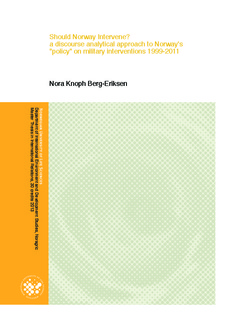| dc.description.abstract | Since 1999 Norway has participated in three military interventions and refused to participate in a fourth. This thesis explores how Norway’s participation in military intervention has been made possible and whether there is a Norwegian policy on military interventions. It adopts a discourse analytical approach as a theoretical basis and as a method. By examining a broad range of texts on the debates on Norway’s participation in interventions it seeks to identify a dominant representation of the circumstances under which Norway will participate. Contrary to what one might expect this thesis finds that it is not possible to identify one coherent discourse on military intervention in Norway or a dominant representation of circumstances under which Norway will participate. Therefore it is not possible to identify a Norwegian policy on military intervention, which makes it difficult to predict Norway’s position in future questions of participation in military interventions. However, the intervention discourse does not appear “out of the blue” whenever a new intervention is debated. Throughout the various interventions we find three main recurrent elements: NATO membership, promotion of the UN and promotion of universal human rights. Through the use of a layered framework these can be understood as fairly permanent construction of principles on which Norwegian foreign policy is based (the strategic level) that are more deeply rooted in constructions on national security and Norwegian self-images (idea level). Although we cannot predict future decisions based on the analysis of the intervention discourse, the layered framework indicates that some representations are more fundamental than others. Thus, actors will have to argue within the frames set on levels one and two: they must provide proper constructions of NATO, the UN and humanitarianism. Consequently Norwegian participation in any future intervention will have to provide proper representations of promotion of international law and the UN, Norway’s obligations to NATO and the allies and offer a proper representation of humanitarian concerns. Otherwise, we can expect a shift in the discourse with, changes in the more fundamental construction of Norwegian foreign policy and/or serious political consequences for any actor that seeks to promote a policy which cannot be argued within the frames of continuity. | no_NO |
